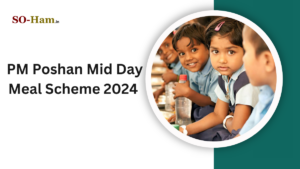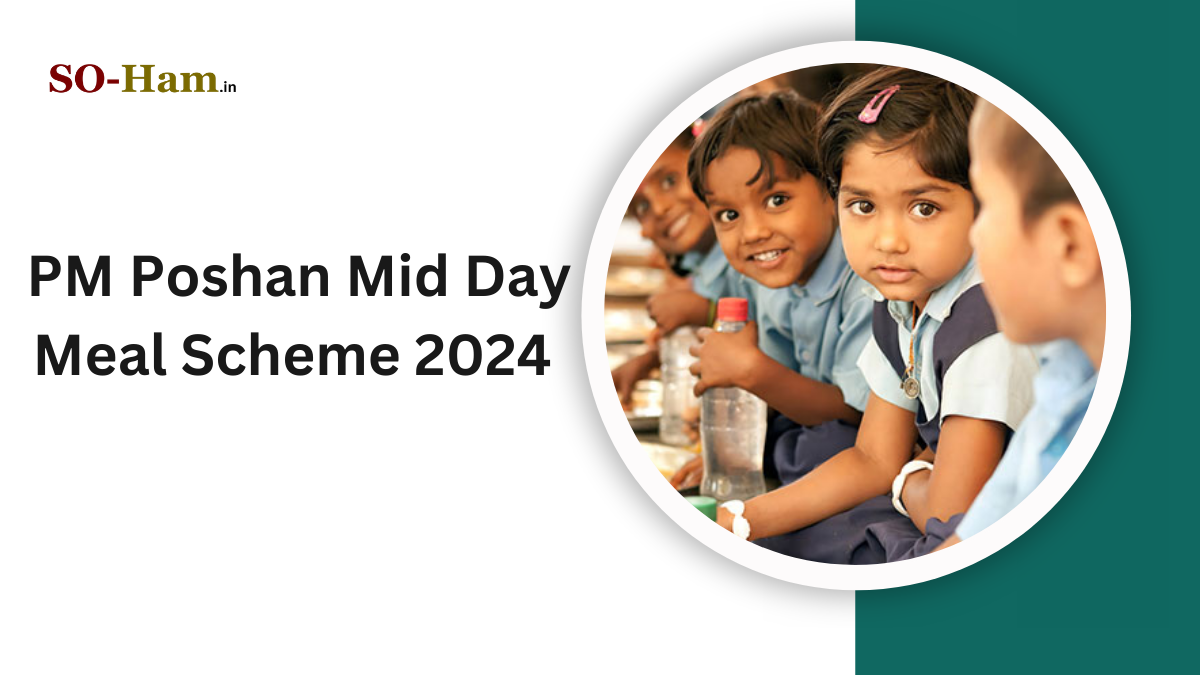The PM Poshan Mid Day Meal Scheme 2024 is a government initiative designed to tackle child malnutrition while promoting education.
This program provides nutritious meals to school children, particularly those from economically disadvantaged families, ensuring they receive at least one balanced meal during school hours.
The scheme is part of the Indian government’s broader efforts to improve the health and educational outcomes of children across the country. In this article, we will explore the core details of the scheme, its eligibility requirements, benefits, and important aspects.

What is the PM Poshan Mid Day Meal Scheme 2024?
The Mid Day Meal Scheme, renamed as the PM Poshan Mid Day Meal Scheme in 2021, was initially launched in 1995 by the Government of India. It aims to improve the nutritional intake of children in government schools and to encourage better school attendance.
By offering free meals during school hours, the scheme encourages children, especially from underprivileged backgrounds, to stay in school and improve their health and academic performance.
The government continues to extend the program to new regions and groups, making it a key intervention in tackling child hunger and educational disparities.
Key Highlights of the PM Poshan Mid Day Meal Scheme
- Target Audience: Children aged 6-14 years.
- Covered Institutions: Government and government-aided schools, Madrasas, Maktabs, and specific educational institutions as defined by the government.
- Objective: To improve school enrollment, attendance, and children’s overall nutritional health.
Advantages of the PM Poshan Mid Day Meal Scheme 2024
The scheme offers a range of benefits not only to children but also to the wider community and the nation as a whole. Below are some of the prominent advantages:
1. Improved Nutrition for Children
By providing nutritious meals, the scheme plays a vital role in combating malnutrition, which is a significant issue in many rural and underdeveloped areas. It helps children meet their daily nutritional needs, contributing to better health and growth.
2. Increased School Attendance
The provision of free meals encourages more children to attend school regularly, addressing absenteeism and dropout rates. In many cases, children are more likely to stay in school when they know they will receive a proper meal.
3. Boost in Academic Performance
Adequate nutrition is closely linked to cognitive development. The scheme provides children with the energy and nutrients needed for improved concentration and learning, leading to better academic performance.
4. Promotes Social Equality
The scheme fosters inclusion by offering meals to children regardless of their socioeconomic background. It helps reduce inequalities and ensures that children from different communities have access to the same nutritional support.
5. Encouragement of Community Participation
The program involves local communities in the preparation and distribution of meals, fostering a sense of shared responsibility. This local involvement also enhances the program’s sustainability and success.
6. Support to Local Economy
Using locally sourced ingredients benefits local farmers and contributes to the regional economy. This aspect of the scheme helps build sustainable agricultural practices while supporting local livelihoods.
7. Focus on Hygiene and Safety
The PM Poshan Mid Day Meal Scheme places emphasis on maintaining hygiene during food preparation and distribution. This ensures that children are consuming safe and clean food, reducing the risk of foodborne illnesses.
8. Skill Development and Employment
In some regions, the scheme provides training to local cooks and workers, offering opportunities for skill development and employment. This benefits both the individuals involved and the community as a whole.
Eligibility Criteria for PM Poshan Mid Day Meal Scheme 2024
The PM Poshan Mid Day Meal Scheme targets children in government and government-aided schools. To qualify for the benefits, certain eligibility criteria must be met.
1. Age and Grade Level
Children enrolled in primary schools (Classes I to V) and upper primary schools (Classes VI to VIII) are eligible for meals under the scheme. The target group primarily consists of children aged 6 to 14 years.
2. Types of Eligible Institutions
The scheme covers a wide range of institutions:
- Government Schools: All government-run schools are eligible.
- Government-aided Schools: Private schools receiving government funding also qualify.
- Religious Schools: Madrasas and Maktabs are included if they meet government guidelines.
- Special Training Centers: These centers under initiatives like Sarva Shiksha Abhiyan are also eligible.
3. Focus on Disadvantaged Groups
The scheme prioritizes children from low-income families and marginalized communities, such as Scheduled Castes (SC), Scheduled Tribes (ST), and other underprivileged groups.
4. Attendance Requirement
While the scheme aims to reach all children in the target age group, regular school attendance is encouraged. This helps ensure that the children receive the benefits of the scheme consistently.
Documents Needed for PM Poshan Mid Day Meal Scheme 2024
To participate in the PM Poshan Mid Day Meal Scheme, schools must provide specific documentation that aligns with the government’s guidelines. Required documents may include:
- School Registration Documents
- Student Enrollment Lists
- Attendance Records
- Nutritional Plans and Meal Menus
- Safety and Hygiene Compliance Records
- Local Procurement Agreements for Ingredients
- Financial Transparency Documents
These documents are crucial to ensure that institutions follow the standards set by the scheme and maintain proper accountability.
Beneficiaries of the PM Poshan Mid Day Meal Scheme 2024
The beneficiaries of the PM Poshan Mid Day Meal Scheme are primarily children enrolled in government and government-aided schools, as well as certain religious and alternative education institutions.
The scheme covers children in Classes I to VIII. It also extends to children from drought-affected areas during the summer months to ensure they do not suffer from nutritional deficiencies.
Additionally, children in Special Training Centers and those enrolled under programs like Sarva Shiksha Abhiyan are eligible for meals.
Conclusion
The PM Poshan Mid Day Meal Scheme 2024 is a vital program that not only provides children with the nutrition they need but also contributes to improved school attendance, better academic outcomes, and reduced dropout rates.
By focusing on children from marginalized communities, the scheme fosters social inclusion and equality.
Furthermore, it supports local economies by sourcing ingredients from local farmers and encourages community participation, ensuring the sustainability and success of the program.
As the scheme continues to evolve, it will undoubtedly play a key role in addressing both nutritional and educational challenges across India.
People May Ask
Who is eligible to benefit from the PM Poshan Mid Day Meal Scheme?
The scheme targets children aged 6 to 14 years enrolled in government and government-aided schools, as well as children in Madrasas, Maktabs, and certain other educational institutions.
What are the benefits of the scheme?
The scheme provides nutritious meals that promote better health, improve school attendance, and enhance children’s cognitive development and academic performance.
Are children from drought-affected regions also covered?
Yes, the scheme provides meals to children in drought-affected areas during summer vacations to ensure continuous nutritional support.
What documents are required for schools to participate in the scheme?
Schools need to submit registration documents, student enrollment lists, attendance records, nutritional plans, and hygiene compliance documents, among others.
Click here to learn more.

